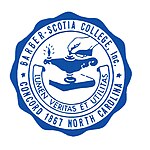Lake Lynn (Cabarrus County, North Carolina)
Bodies of water of Cabarrus County, North CarolinaCentral North Carolina geography stubsReservoirs in North Carolina
Lake Lynn is a small 18 acre (7.3 ha) lake located in the central part of Cabarrus County, North Carolina. It is situated between state highway 73 East and Old Airport Road. Lake Lynn Road connects these two through a twisting two lane road and affords some views of the lake and its small ponds. Lake Lynn is a natural lake and averages 28 feet (8.5 m) in depth. Some species of wildlife you may find in and around the lake are deer, squirrel, raccoon, opossum, skunk, small mouth bass, brim.
Excerpt from the Wikipedia article Lake Lynn (Cabarrus County, North Carolina) (License: CC BY-SA 3.0, Authors).Lake Lynn (Cabarrus County, North Carolina)
Thompson Drive,
Geographical coordinates (GPS) Address Nearby Places Show on map
Geographical coordinates (GPS)
| Latitude | Longitude |
|---|---|
| N 35.398333333333 ° | E -80.530555555556 ° |
Address
Lake Lynn
Thompson Drive
28025
North Carolina, United States
Open on Google Maps





